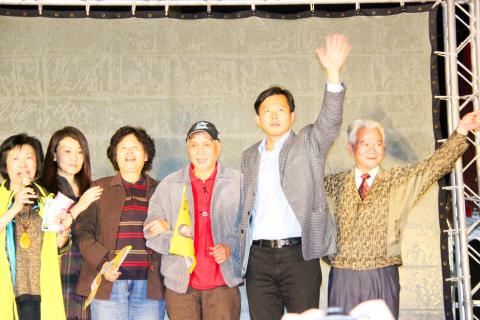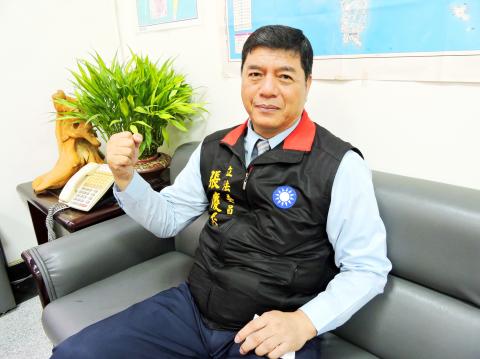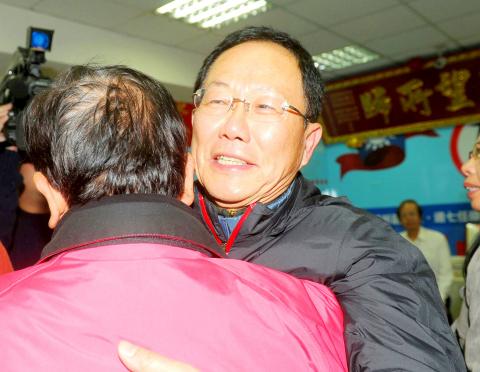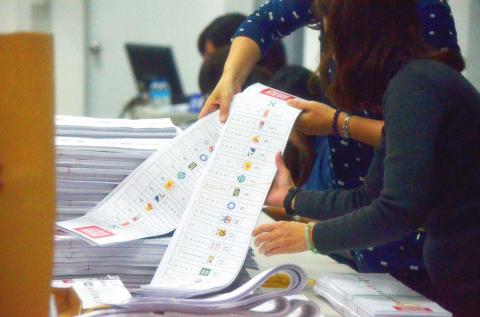The New Power Party (NPP) won five seats in yesterday’s legislative elections to become the third-largest party, representing a triumph for the new “third force” party founded by civil activists associated with the 2014 Sunflower movement.
The NPP scored two legislator at-large seats, winning 6.1 percent of the legislator at-large party vote, in a sharp drop from pre-election polling after the Democratic Progressive Party (DPP) issued calls for pan-green voters to concentrate their votes to protect the “safe” seats on its legislator-at-large list.
However, DPP endorsements helped push some of the party’s district candidates to victory, with former Academia Sinica researcher Huang Kuo-chang (黃國昌) winning New Taipei City’s 12th district, Hung Tzu-yung (洪慈庸) — who is best known for speaking on behalf of her bereaved family after her younger brother, army corporal Hung Chung-chiu (洪仲丘), died in July 2013 under controversial circumstances only days from being discharged — winning Taichung’s third district, and metal band Chthonic’s lead vocalist Freddy Lim (林昶佐) winning a tight race for Taipei’s fifth district in a surprise upset.

Photo: CNA
The DPP endorsed Huang, Lim and Hung in a bid to topple Chinese Nationalist Party (KMT) incumbents in what were previously considered pan-blue districts.
The party’s other district candidate, human rights lawyer Chiu Hsien-chih (邱顯智), was defeated by former DPP caucus whip Ker Chien-ming (柯建銘) in a three-way race for Hsinchu City’s legislative district after refusing to drop out of the race in response to DPP pressure.
The NPP’s success came as the Taiwan Solidarity Union’s (TSU) support crumbled, losing all three of its legislator-at-large seats.

Photo: Lin Hsin-han, Taipei Times
Pairing with the pro-independence leftist activist group Radical Flank (基進側翼), whose Chairman Chen Yi-chi (陳弈齊) headed the party’s legislator-at-large slate, failed to ward off a sharp drop in support, with the party winning 2.5 percent of the at-large vote, falling short of the 8.96 percent it won in 2012.
National Taiwan University political science professor Wang Yeh-lih (王業立) said the rise of the NPP was the main factor behind the TSU’s decline.
“The NPP stems from the leadership of the Sunflower movement, which opposed a trade in services agreement with China, so they attracted a substantial portion of voters dissatisfied with China. These voters mainly voted for the TSU in the election four years ago,” National Taiwan University political science professor Wang Yeh-lih (王業立) said. “As TSU’s candidates were not as well-known as the NPP’s, and the NPP is skilled at using new media, the NPP was able to achieve much greater visibility than the TSU.”

Photo: Lai Hsiao-tung, Taipei Times
The Green Party-Social Democratic Party Alliance won only 2.52 percent of the legislator at-large vote, also failing to win any district seats.
The Social Democratic Party, which was founded by many long-standing social campaigners, had competed with the NPP to carry the “third force” banner after a split within the movement, joining forces within the Green Party after integration talks broke down over relations with the DPP.
While the NPP endorsed DPP presidential candidate Tsai Ing-wen (蔡英文) and — with the exception of Chiu — competed only for districts where the DPP “made way,” the alliance did not coordinate with the DPP.

Photo: CNA
The People First Party (PFP) received 6.52 percent of the legislator-at-large vote, holding on to its two legislator-at-large seats.
The New Party received 4.18 percent of the vote, crossing the newly lowered 3.5 percent threshold to receive election subsidies.
The Republican Party received only 1.62 percent of the vote, while losing its sole legislative seat representing Hsinchu County, after the party’s chairwoman and sole legislator Hsu Hsin-ying (徐欣瑩) withdrew from the race to serve as PFP presidential candidate James Soong’s (宋楚瑜) running mate.

Photo: CNA

Chinese spouse and influencer Guan Guan’s (關關) residency permit has been revoked for repeatedly posting pro-China videos that threaten national security, the National Immigration Agency confirmed today. Guan Guan has said many controversial statements in her videos posted to Douyin (抖音), including “the red flag will soon be painted all over Taiwan” and “Taiwan is an inseparable part of China,” and expressing hope for expedited reunification. The agency last year received multiple reports alleging that Guan Guan had advocated for armed reunification. After verifying the reports, the agency last month issued a notice requiring her to appear and explain her actions. Guan

GIVE AND TAKE: Blood demand continues to rise each year, while fewer young donors are available due to the nation’s falling birthrate, a doctor said Blood donors can redeem points earned from donations to obtain limited edition Formosan black bear travel mugs, the Kaohsiung Blood Center said yesterday, as it announced a goal of stocking 20,000 units of blood prior to the Lunar New Year. The last month of the lunar year is National Blood Donation Month, when local centers seek to stockpile blood for use during the Lunar New Year holiday. The blood demand in southern Taiwan — including Tainan and Kaohsiung, as well as Chiayi, Pingtung, Penghu and Taitung counties — is about 2,000 units per day, the center said. The donation campaign aims to boost

The Kaohsiung Tourism Bureau audited six hotels in an effort to prevent price gouging ahead of Korean band BTS’ concert tour in the city scheduled for Nov. 19, 21 and 22 this year. The bureau on Friday said that the audits — conducted in response to allegations of unfair pricing posted on social media — found no wrongdoing. These establishments included the local branches of Chateau de Chine, Hotel Nikko, My Humble House, and Grand Hai Lai, it said, adding that the Consumer Protection Commission would have penalized price gougers had the accusations been substantiated. The bureau said the Tourism Development Act

The Central Weather Administration (CWA) said a magnitude 4.9 earthquake that struck off the coast of eastern Taiwan yesterday was an independent event and part of a stress-adjustment process. The earthquake occurred at 4:47pm, with its epicenter at sea about 45.4km south of Yilan County Hall at a depth of 5.9km, the CWA said. The quake's intensity, which gauges the actual effects of a temblor, was highest in several townships in Yilan and neighboring Hualien County, where it measured 4 on Taiwan's seven-tier intensity scale, the CWA said. Lin Po-yu (林柏佑), a division chief at the CWA's Seismological Center, told a news conference